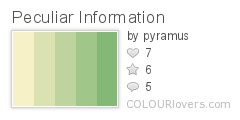Strange But True
Colourlovers again. How much pleasure I get from it!
I have a fairly literal mind so most of my palettes are pretty straightforward, like this one.

Cookie colours. Pretty obvious.
But sometimes the randomness takes over and I end up with something like this

with colour names "Collateral Damage", "Accidental Triumph", "Distant Perspective", "Unavoidable Friction", and "Retrograde Motion". No, it doesn't mean anything. No, I don't know what I was thinking when I made up the names for it. But it's pretty, and sometimes you need a little chunk of Dada in your life.
And then I started wondering exactly how the word "peculiar" came to be. It sounds so much like "pecuniary", and yet their meanings are so entirely unrelated that it was obvious we had two different sources. Obvious, yes, and wrong; the words are brothers, amazingly enough.
"Peculiar" is older. Its source is Latin "pecu", "farm animals, a flock". This led to "peculium", "property", and then to "peculiaris", "one's own". (This is a very logical progression of meanings.) "Peculiar", then, came to mean "specific to a person or thing; distinctive", and then by extension "strange" (when something specific to another isn't something you're used to).
"Pecuniary", which means "relating to money", has obvious ties to "pecu", particularly in a time when everything you were worth might be tied up in your flock.
There are several more scions of "pecu", all perfectly logical and all most unexpected. French derived from this word "fie" (no relation to the expression of disgust), which English eventually (through Germanic languages) absorbed as "fee". This in turn led to "fief" and "fiefdom", lands subject to feudal obligations. "Feudal" itself is a member of the family, descended from "fee" (and unrelated to "feud" meaning "hostile contention").
And one more completely left-field scion of "pecu". The Norse spawn of "pecu", "fe" (parallel to French "fie"), led to "felagi", essentially "business partner", which was transformed in Old English into "feolaga" and eventually, after such false-start spellings such as "felowe" and "felawe", "fellow".
I have a fairly literal mind so most of my palettes are pretty straightforward, like this one.

Cookie colours. Pretty obvious.
But sometimes the randomness takes over and I end up with something like this

with colour names "Collateral Damage", "Accidental Triumph", "Distant Perspective", "Unavoidable Friction", and "Retrograde Motion". No, it doesn't mean anything. No, I don't know what I was thinking when I made up the names for it. But it's pretty, and sometimes you need a little chunk of Dada in your life.
And then I started wondering exactly how the word "peculiar" came to be. It sounds so much like "pecuniary", and yet their meanings are so entirely unrelated that it was obvious we had two different sources. Obvious, yes, and wrong; the words are brothers, amazingly enough.
"Peculiar" is older. Its source is Latin "pecu", "farm animals, a flock". This led to "peculium", "property", and then to "peculiaris", "one's own". (This is a very logical progression of meanings.) "Peculiar", then, came to mean "specific to a person or thing; distinctive", and then by extension "strange" (when something specific to another isn't something you're used to).
"Pecuniary", which means "relating to money", has obvious ties to "pecu", particularly in a time when everything you were worth might be tied up in your flock.
There are several more scions of "pecu", all perfectly logical and all most unexpected. French derived from this word "fie" (no relation to the expression of disgust), which English eventually (through Germanic languages) absorbed as "fee". This in turn led to "fief" and "fiefdom", lands subject to feudal obligations. "Feudal" itself is a member of the family, descended from "fee" (and unrelated to "feud" meaning "hostile contention").
And one more completely left-field scion of "pecu". The Norse spawn of "pecu", "fe" (parallel to French "fie"), led to "felagi", essentially "business partner", which was transformed in Old English into "feolaga" and eventually, after such false-start spellings such as "felowe" and "felawe", "fellow".

0 Comments:
Post a Comment
<< Home